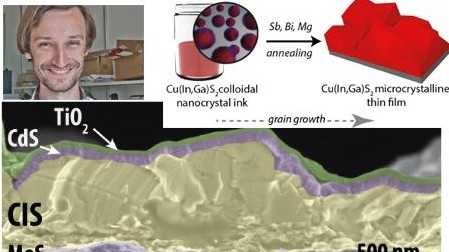Feb 1 2016
Dr. Guijarro has devloped a facile and scalable method to prepare (Cu(In,Ga)S2) photocathodes and demonstrated their state-of-the-art performance for Solar Hydrogen production. The results have been plublished in Advanced Energy Materials.
 © 2016 EPFL
© 2016 EPFL
The development of solution-processable routes to prepare efficient photoelectrodes for water splitting is highly desirable to reduce manufacturing costs. Recently, sulfide chalcopyrites (Cu(In,Ga)S2) have attracted attention as photocathodes for hydrogen evolution owing to their outstanding optoelectronic properties and their band gap—wider than their selenide counterparts—which can potentially increase the attainable photovoltage. A straightforward and all-solution-processable approach for the fabrication of highly efficient photocathodes based on Cu(In,Ga)S2 is reported for the first time. It is demonstrated that semiconductor nanocrystals can be successfully employed as building blocks to prepare phase-pure microcrystalline thin films by incorporating different additives (Sb, Bi, Mg) that promote the coalescence of the nanocrystals during annealing. Importantly, the grain size is directly correlated to improved charge transport for Sb and Bi additives, but it is shown that secondary effects can be detrimental to performance even with large grains (for Mg). For optimized electrodes, the sequential deposition of thin layers of n-type CdS and TiO2 by solution-based methods, and platinum as an electrocatalyst, leads to stable photocurrents saturating at 8.0 mA cm–2 and onsetting at ≈0.6 V versus RHE under AM 1.5G illumination for CuInS2 films. Electrodes prepared by our method rival the state-of-the-art performance for these materials.